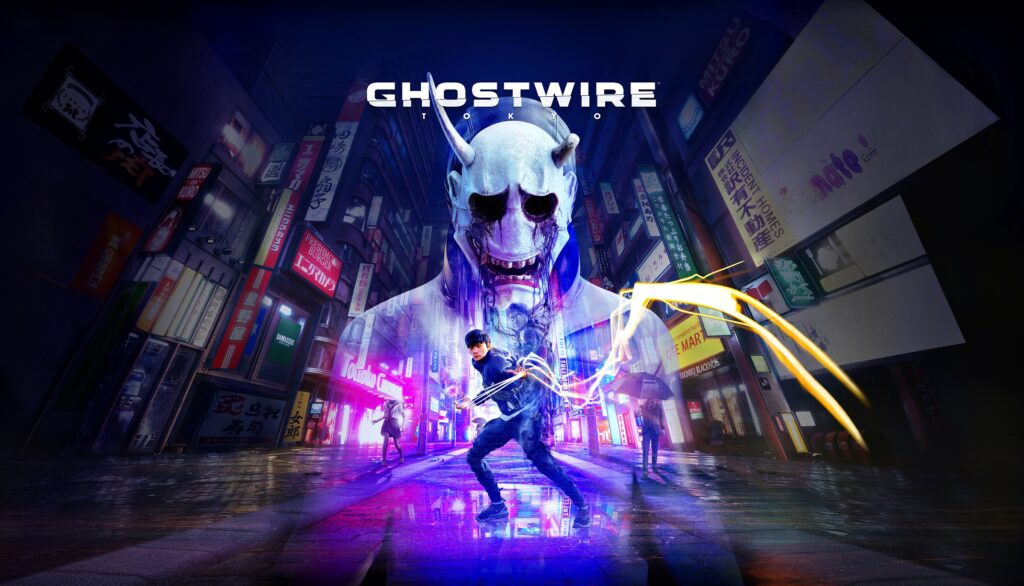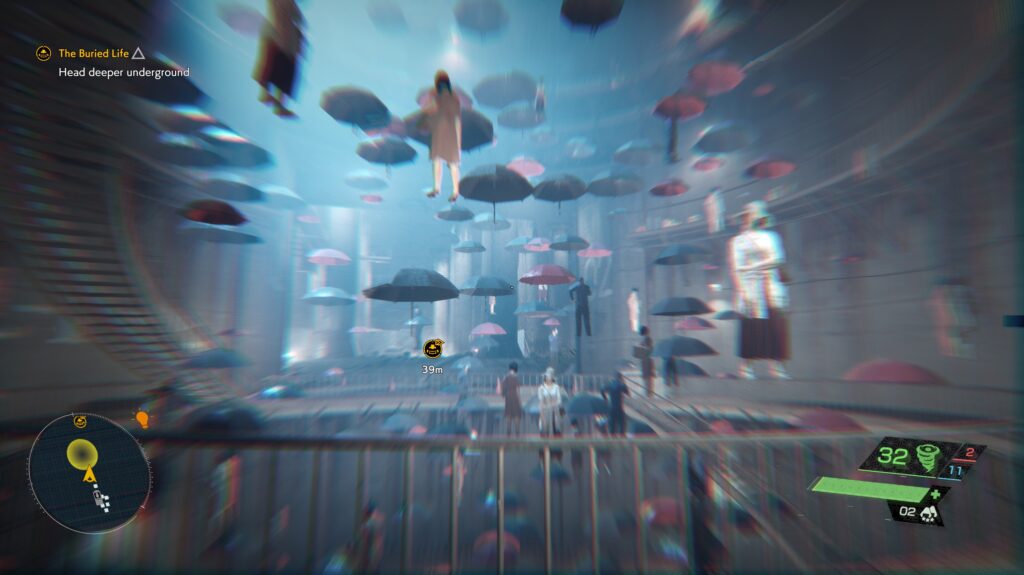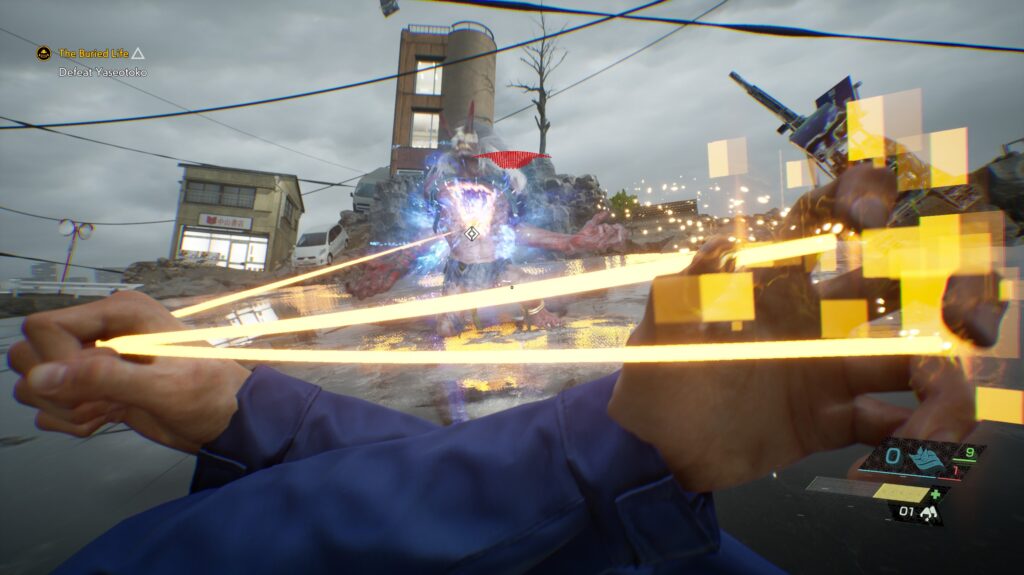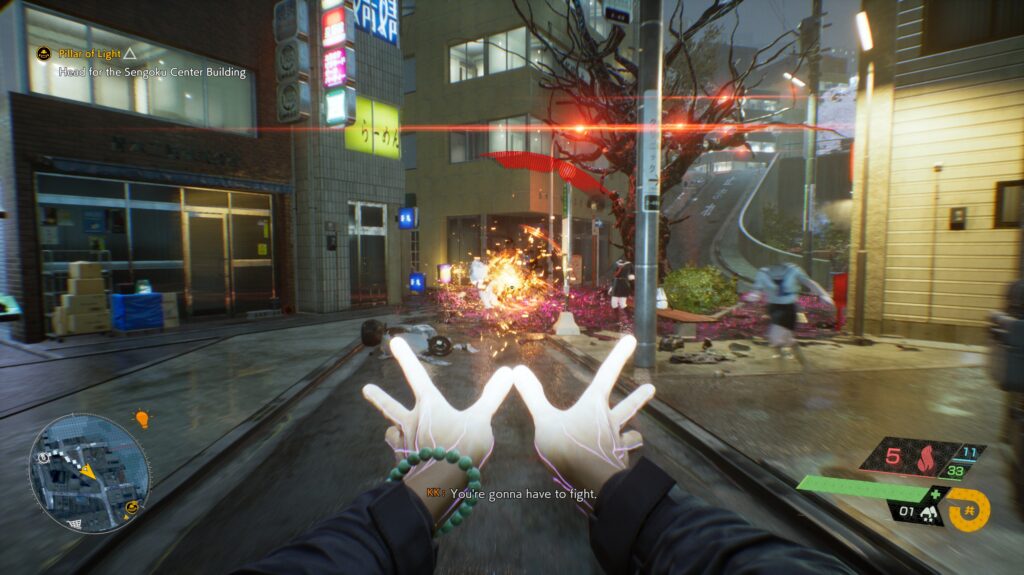
Developer: Tango Gameworks
Publisher: Bethesda Softworks
Platform: PC, PS5
Tested on: PC
GhostWire: Tokyo – Review
GhostWire: Tokyo has been released for PC and PS5 as an exclusive for the period of one year. We were happy to try the full release out for ourselves, as a small two months ago, we were only able to view a good 30 minutes of gameplay through a live stream (see that article by clicking here). The game looked very promising, though we had some small doubts as to where the full release would head towards. Our biggest questions were if the combat would be fun/challenging enough, and if this would be more of a completionist game where you would run around collecting loads of stuff instead of doing much else. We got our answers now.
Story
The story of GhostWire: Tokyo follows Akito, a man who seems to be the sole survivor of a massive attack on Tokyo. This attack completely vaporated all the residents by means of a mysterious fog. If it wasn’t for KK, a mysterious dead ghost hunter who chose to enter Akito’s body, Akito might have met the same fate. They go on a shared journey to the origin of the mysterious fog. Akito is trying to find his sister, while it remains somewhat of a secret what KK is after. The pace of this story is quite slow as you will discover that there is a lot of collecting to do between key points of the story, actually making it quite a chill experience. During their quest, KK and Akito encounter many Japanese ghosts, deadly issues, and just general Japanese themes and folklore. GhostWire: Tokyo is filled to the brim with Japanese culture, which is nice if you are interested in said culture.
Graphics
You will find the strong Japanese flavors in everything, especially the graphics. Enemies are designed to be ghostly Japanese no-face creatures in suits, typical Japanese horror girls with long black hair or school uniforms, and more. There are loads of spiritual references to be found such as a Daruma doll or Shikigami (named Katashiro in the game), which are the folded paper manikins that you also see in movies such as Spirited Away. With all these references, the core of Japanese folklore has been grasped amazingly well in GhostWire: Tokyo. It’s also amazing how the city of Tokyo has been brought to a digital world and actually feels like (part of) the actual city when you wander the streets.
On the other hand, we are slightly less enthusiastic about the special effects of (magic) attacks that you can use during the game. Some of the effects are fine, but a lot are also messy, convoluting the screen with an oversaturation of objects or particles. A good example of such a moment is every sneak attack you manage to pull off from behind. Akito smacks a seal or his hand on the back of the target enemy, and then what looks like glowing kanji characters are everywhere. There are so many that it is hard to see what exactly is going on. Another example would be the visuals that indicate Akito is a host body for KK. There’s black smoke coming out of half his face and there are some type of weird ghostly wires running on his hand indicating special powers, but these are blended poorly with the rest of the Akito character model.
Sound
When we had a glimpse at the preview version, we quite liked the music. Sadly, there was actually not so much music to be found while playing ourselves. Apart from the menu and some battles, most of the game seems to be fairly silent in terms of background music. Luckily, the ambient sounds make up for a lot. We loved the alluring music that plays in the shops for example. It also allows you to listen to the floating spirits of the departed around you, and the great voice acting of the main protagonists. It all adds up to a great atmosphere. While we were slightly disappointed by the lack of music at the start, we can confidently say that the sound design for GhostWire: Tokyo is great. It’s somewhere between a movie and an anime (overreactions in voices from i.e. small kids), which is exactly what you would expect from a game so heavily influenced by Japanese culture.
Gameplay
GhostWire: Tokyo is a game that’s more of a first-person action adventure than anything else. Yes, it has some horror references, but the game is far from particularly scary. If anything, it’s actually a surprisingly relaxing game that mainly focuses on collecting stuff and following the story. You find yourself in an open-world type of environment based on Tokyo, but you are limited by “fog” areas, which will damage you as you try to walk through them. This actually makes the area you play in quite confined most of the time, but it does give the cozy vibe of strolling through late-night (spooky locked-down) Tokyo.
While going on this stroll (towards the main story objective) you will find there’s some stuff to do. There are dogs and cats to pet, shops run by cats that sell food, and quite a bit to collect. The vaporized citizens of Tokyo are floating in groups of spirits that you can absorb, to later trade them for money and experience. Some cats offer you money for special collectibles that you can try to find with only a hint, like a treasure hunt. Not only will you find yourself easily distracted by these hoarder mechanics, but they are also somewhat obligatory as it gives you the XP you need to level up. Leveling up makes your combat easier and more sustainable.
Especially at the start, combat is easy. The game’s fights are really straightforward. You start with green magic, shooting attacks out of your hands like a small pistol. Later you get red magic which is strong but has limited ammunition, blue magic that’s mainly good for close combat, and more. While the game tries to vary between attacks by i.e. giving you a bow or giving you stronger enemies later on, all enemies generally move slowly and you will have plenty of time to run around and kill them. This makes even the shooting a somewhat relaxing clean-up business instead of your regular chaotic run-of-the-mill shooter experience. This is not so bad, but combat is definitely not what this game is about. It’s about taking your time to just enjoy the view and collect some stuff, completing it all bit by bit.
Conclusion
GhostWire: Tokyo is unique, to say the least. The game offers a cozy walk through the streets of a paranormally-wrecked Tokyo, while you collect loads of stuff and sometimes fight enemies in challenge-lacking combat. It’s a game that feels relaxing in a way, and it is not afraid to take slow steps towards the climax of the story. On top of that, it’s definitely doing a good job portraying Japanese culture and folklore. If you want a fast-paced shooter, don’t go for this title. If you want something different, try it out at least. We enjoyed it for what it is.
GhostWire: Tokyo - Review,








No Comments